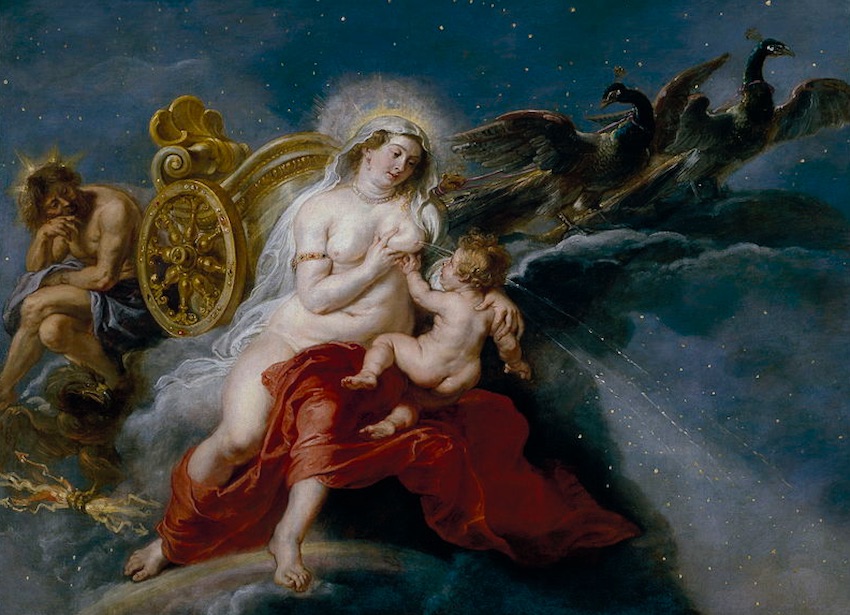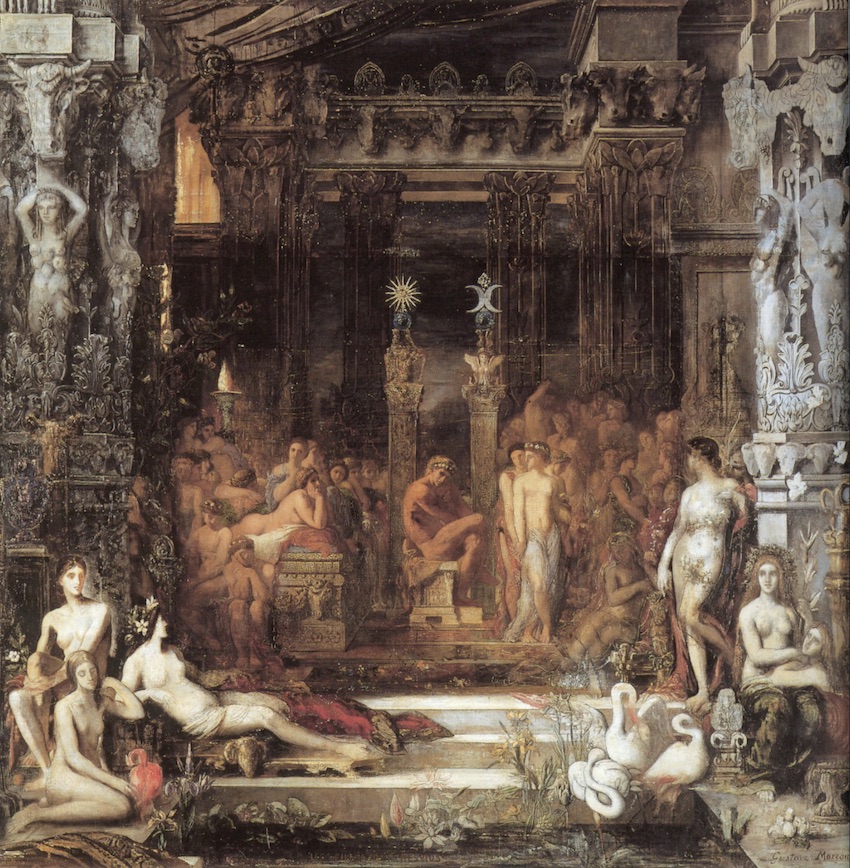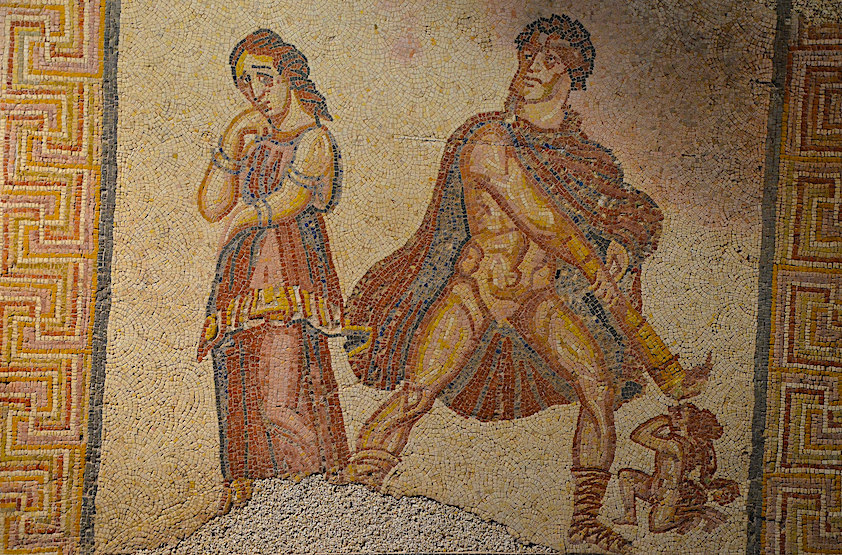Birth & Childhood of Herakles

The Birth of the Milky Way by Peter Paul Rubens (1577–1640)
On the night before Amphitryon arrived in Thebes, Zeus (always on the lookout for occasions like this) disguised himself as Amphitryon and came to Alkmene's bedroom. "I've returned victorious," he said, and showed her some Taphian weapons and a Taphian gold cup. They then went to bed together and Zeus enjoyed the night so much he extended it to three times its normal length. As a result of this extraordinary kength of time, Herakles, the greatest of all heroes, was conceived.
The next night the real Amphitryon returned, announced his victory, and went to bed with Alkmene. On this night Herakles' half-brother Iphikles was conceived. Wondering about his wife's lack of enthusiasm, Amphitryon asked the famous blind prophet Teiresias, who told him about Zeus' appearance the long night before.
When Alkmene went into labor before the birth of her children, Zeus announced to all the gods that the next descendant of Perseus to be born would be the next king of Mycenae. He purposely kept his pronouncement vague so as not to make Hera jealous, but she of course knew that he was referring to Herakles and sent her daughter Eileithyia, a goddess of childbirth, to prevent Herakles' birth. Eileithyia sat outside the room where Alkmene was in labor, and as long as she kept her legs, arms, and fingers crossed Alkmene could not give birth. During the protracted labor of Alkmene, Hera sped up the birth of Sthenelos' son Eurystheus, and, since Eurystheus was a descendant of Perseus, he won the kingship of Mycenae that Zeus had intended for Herakles. Alkmene would probably still be in labor, in fact, if she had not had a clever servant named Galanthis, who recognized Eileithyia and came out of Alkmene's room to announce (falsely) that Alkmene had just given birth to a son. Eileithyia jumped up in surprise and when she uncrossed her various extremities Herakles really was born. Hera angrily changed Galanthis into a weasel, and on the next night Almene gave birth to her other son Iphikles, Amphitryon's child.
Shortly after Herakles' birth, his mother Alkmene took the baby to a desolate plain out side of Thebes and abandoned him, since she was afraid of Hera's jealousy. However Athena, the patron of most heroes, saw him from Olympos and suggested to Hera that they take a walk on earth. They came to where the baby lay, hungry and crying, and Athena said to Hera, "I can't do anything to help this baby, but you're one of those mother goddesses. Why don't you feed him?" Hera, not knowing it was Herakles, began to nurse him at her breast, but Herakles sucked so hard that it hurt her. Hera pushed him away, and the force of her rejection (and of his sucking) was so great that milk flew from his mouth and her breast up into the sky. This is the Greek myth of the origin of the Milky Way.
When Herakles was only a few months old, Hera put two enormous serpents in the crib where Herakles and Iphikles slept. Herakles took a serpent in each hand and choked them to death. Some said it was his step-father Amphitryon who put the serpents in the crib, since he wanted to learn which son was his; when Herakles killed the serpents and Iphikles whimpered in the corner, he knew the answer.
As Herakles grew up, he had as private tutors the most famous practitioners of all the arts. Eurytos, the world's best archer, taught him archery, Autolykos taught him wrestling, Kastor taught him the use of weapons, and Linos, the brother of Orpheus, gave him music lessons. Herakles excelled in everything that required physical strength and ability, but he was a failure at music. When his teacher chastised him for playing the lyre poorly, Herakles hit Linos on the head with his lyre and killed him.
The three children Hera has with Zeus, all rather unimportant,
are the war-god Ares and two daughters Eileithyia and the eternally 12-year-old
Hebe. All three appear in the Herakles myth.
Herakles and the Thespian Lion

Daughters of Thepios by Gustave Moreau 1853Musée National Gustave Moreau, Paris, France
Alarmed by this gratuitous violence, Amphitryon decided that Herakles should spend some time away from the company of other people and gave him a job herding cattle in a distant area near Thespiai. At the age of eighteen, Herakles performed his first heroic task, to kill a lion which lived on Mount Kithairon and was ravaging the herds of Amphitryon and his neighbor Thespios, king of Thespiai. Thespios and his wife Megamede had fifty daughters; since he wanted to have Herakles (and therefore Zeus) as a relative, Thespios invited Herakles to stay with him while hunting the lion and each night sent in one of his daughters to sleep with Herakles. In other versions Herakles spent only one night with Thespios, during which forty-nine of the fifty daughters visited his bed, or seven nights, during each of which he impregnated seven daughters; since these versions accounted for only forty-nine, the fiftieth was said to have refused Herakles’ embrace and to have become later the virgin priestess of the cult of the divine Herakles. In any case Herakles never realized that Thespios had more than one daughter. As for the lion, Herakles killed it and made its skin and head into his famous cloak and helmet; more often, however, this is said of the Nemean lion, which Herakles killed during his first labor.
As he was returning to Thebes, Herakles met heralds from the Minyan kingdom of Orchomenos, just north of Thebes. The Minyans had defeated the Thebans in a war and compelled them to pay him an annual tribute of one hundred cattle, and the heralds met by Herakles were on their way to collect this payment. Herakles cut off the heralds’ ears, noses, and hands and told them to take these as tribute to their king.. In the ensuing battle Herakles defeated the Minyans and forced them to pay double tribute to Thebes. Kreon, king of Thebes, gave his oldest daughter Megara to Herakles as a reward for his valor, and he gave his youngest daughter to Herakles’ brother Iphikles (who already had a son named Iolaos).
The Madness of Herakles

Mosaic from the Villa Torre de Palma near Monforte, 3rd-4th century CE (National Archaeology Museum of Lisbon, Portugal).
After Herakles and Megara had a number of sons (from
two to eight, according to different sources), Hera drove him mad and he
killed his sons (and, in some versions, his wife Megara as well).
He was purified for this crime by Thespios, presumably still grateful for
Herakles’ insemination of his daughters, and went to Delphi to ask Apollo
where he should live. The Pythia (the Delphic priestess) gave him
the name Herakles (he had earlier been called Alkaios or Alkides) and told
him to live in Tiryns and to serve Eurystheus, king of Mycenae, for twelve
years; if he successfully accomplished the labors imposed on him by Eurystheus,
she said, he would become immortal.
Hera, the stepmother (and thus the persecuting “bad mother”)
of the many heroes fathered by Zeus, is especially hostile to Herakles,
the greatest of all heroes. Indeed a primary cause of Herakles’ greatness
is the superhuman efforts he must make to carry out her will or protect
himself against her; in one account the people of Argos gave Herakles his
name, meaning “Glory of Hera,” immediately after he strangled the serpents
in his bed.
Before his birth and throughout his life, the intentions
of Hera underlie everything that Herakles does or suffers; only after his
death and apotheosis will he be reconciled with her. The nursing
episode is a particularly revealing indication not only of the psychological
basis of Hera’s enmity (the male child’s fantasy of a feared and rejecting
mother) but also of a certain ambivalence in the relationship: the
one time Hera assumes a maternal role, giving Herakles the milk which provides
life (and in some versions immortality), she becomes the bad mother who
rejects the child from her breast and denies him this fundamental expression
of maternal nurturance.
Three closely related motives will recur prominently throughout Herakles’ life: the search for a good (that is, nurturant but unthreatening) mother, the attainment of immortality, and the demonstration of unfailing virility. The first two motives are already present in the nursing episode, and the third will initially appear at the end of Herakles’ childhood, during his stay at Thespiai; fulfillment of these three wishes will end Hera’s persecution and make Herakles similar to his father Zeus, greatest of the gods and the exemplification of supreme male sexuality.
